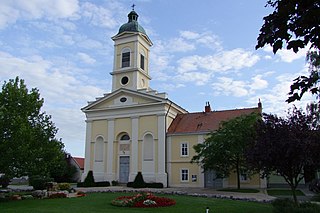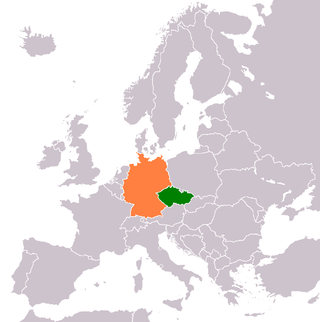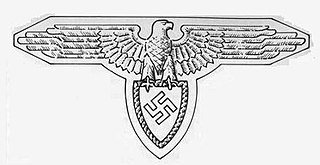External links
| International | |
|---|---|
| National | |
| | This article about an organisation based in Germany is a stub. You can help Wikipedia by expanding it. |
The Karpatendeutsche Landsmannschaft Slowakei (English: Carpathian German Homeland Association Slovakia) is an organization of German refugees expelled from their homes in Slovakia after World War II. The organization is based in Stuttgart, and it was founded in 1949.

Czechoslovakia was a landlocked country in Central Europe, created in 1918, when it declared its independence from Austria-Hungary. In 1938, after the Munich Agreement, the Sudetenland became part of Nazi Germany, while the country lost further territories to Hungary and Poland. Between 1939 and 1945, the state ceased to exist, as Slovakia proclaimed its independence and Carpathian Ruthenia became part of Hungary, while the German Protectorate of Bohemia and Moravia was proclaimed in the remainder of the Czech Lands. In 1939, after the outbreak of World War II, former Czechoslovak President Edvard Beneš formed a government-in-exile and sought recognition from the Allies.

The Sudetenland is the historical German name for the northern, southern, and western areas of former Czechoslovakia which were inhabited primarily by Sudeten Germans. These German speakers had predominated in the border districts of Bohemia, Moravia, and Czech Silesia since the Middle Ages. Since the 9th century the Sudetenland had been an integral part of the Czech state both geographically and politically.

During the later stages of World War II and the post-war period, Germans and Volksdeutsche fled and were expelled from various Eastern and Central European countries, including Czechoslovakia, and from the former German provinces of Lower and Upper Silesia, East Prussia, and the eastern parts of Brandenburg (Neumark) and Pomerania (Hinterpommern), which were annexed by Poland and the Soviet Union.

The military occupation of Czechoslovakia by Nazi Germany began with the German annexation of the Sudetenland in 1938, continued with the creation of the Protectorate of Bohemia and Moravia, and by the end of 1944 extended to all parts of Czechoslovakia.
With the collapse of the Austria-Hungary at the end of World War I, the independent country of Czechoslovakia was formed as a result of the critical intervention of U.S. President Woodrow Wilson, among others.
The Centre Against Expulsions was a planned German documentation centre for expulsions and ethnic cleansing, particularly the expulsion of Germans after World War II. Since March 19, 2008 the name of the project is Sichtbares Zeichen gegen Flucht und Vertreibung.

The First Vienna Award was a treaty signed on 2 November 1938 pursuant to the Vienna Arbitration, which took place at Vienna's Belvedere Palace. The arbitration and award were direct consequences of the previous month's Munich Agreement, which resulted in the partitioning of Czechoslovakia.

Carpathian Germans are a group of ethnic Germans in Central and Eastern Europe. The term was coined by the historian Raimund Friederich Kaindl (1866–1930), originally generally referring to the German-speaking population of the area around the Carpathian Mountains: the Cisleithanian (Austrian) crown lands of Galicia and Bukovina, as well as the Hungarian half of the Austro-Hungarian monarchy, and the northwestern (Maramuresch) region of Romania. Since the First World War, only the Germans of Slovakia and those of Carpathian Ruthenia in Ukraine have commonly been called Carpathian Germans.

The Beneš decrees were a series of laws drafted by the Czechoslovak government-in-exile in the absence of the Czechoslovak parliament during the German occupation of Czechoslovakia in World War II. They were issued by President Edvard Beneš from 21 July 1940 to 27 October 1945 and retroactively ratified by the Interim National Assembly of Czechoslovakia on 6 March 1946.
Czechization or Czechisation is a cultural change in which something ethnically non-Czech is made to become Czech.

German Hungarians are the ethnic German minority of Hungary, sometimes also called Danube Swabians, many of whom call themselves "Shwoveh" in their own Swabian dialect. There are 131,951 German speakers in Hungary. Danube Swabian is a collective term for a number of German ethnic groups who lived in the former Kingdom of Hungary, including the Kingdom of Croatia-Slavonia and Vojvodina. Other ethnic German groups previously lived on the territory of both the former Hungarian kingdom as well as on the territory of present-day Hungary since the Middle Ages onwards, most notably in Budapest but not only.

Hungarians constitute the largest minority in Slovakia. According to the 2021 Slovak census, 456,154 people declared themselves Hungarian, while 462,175 stated that Hungarian was their mother tongue.
The presence of German-speaking populations in Central and Eastern Europe is rooted in centuries of history, with the settling in northeastern Europe of Germanic peoples predating even the founding of the Roman Empire. The presence of independent German states in the region, and later the German Empire as well as other multi-ethnic countries with German-speaking minorities, such as Hungary, Poland, Imperial Russia, etc., demonstrates the extent and duration of German-speaking settlements.
The expulsion of Germans from Czechoslovakia after World War II was part of a series of evacuations and deportations of Germans from Central and Eastern Europe during and after World War II.

Deutsch Jahrndorf is a municipality in the district of Neusiedl am See, in the Austrian state of Burgenland. It is within a few kilometres of the borders of both Hungary and Slovakia. Deutsch Jahrndorf is the easternmost municipality of Austria, at 17th meridian east, and the easternmost commune of the German Sprachraum since 1945 and the expulsions of the Germans.

Czechoslovak resistance to the German occupation of the Protectorate of Bohemia and Moravia during World War II began after the occupation of the rest of Czechoslovakia and the formation of the protectorate on 15 March 1939. German policy deterred acts of resistance and annihilated organizations of resistance. In the early days of the war, the Czech population participated in boycotts of public transport and large-scale demonstrations. Later on, armed communist partisan groups participated in sabotage and skirmishes with German police forces. The most well-known act of resistance was the assassination of Reinhard Heydrich. Resistance culminated in the so-called Prague uprising of May 1945; with Allied armies approaching, about 30,000 Czechs seized weapons. Four days of bloody street fighting ensued before the Soviet Red Army entered the nearly liberated city.

Czech–German relations are the relationship between the Czech Republic and Germany. The two countries share 815 km of common borders and both are members of the European Union, NATO, OECD, OSCE, Council of Europe and the World Trade Organization.
The Czechoslovak–Hungarian population exchange was the exchange of inhabitants between Czechoslovakia and Hungary after World War II. Between 45,000 and 120,000 Hungarians were forcibly transferred from Czechoslovakia to Hungary, and their properties confiscated, while around 72,000 Slovaks voluntarily transferred from Hungary to Czechoslovakia.

Franz Karmasin was an ethnic German politician in Czechoslovakia, who helped found the Carpathian German Party. During World War II he was state secretary of German affairs in the Slovak Republic, and rose to the rank of SS-Sturmbannführer.

Freiwillige Schutzstaffel was a paramilitary organization in the World War II Slovak Republic. FS was founded in late 1938. Modelled on the German Sturmabteilung (SA) and the Allgemeine SS, FS organized members of the German community in Slovakia. It functioned as the paramilitary wing of the German Party (DP). Walter Donath served as the national commander (Landesführer) of FS.